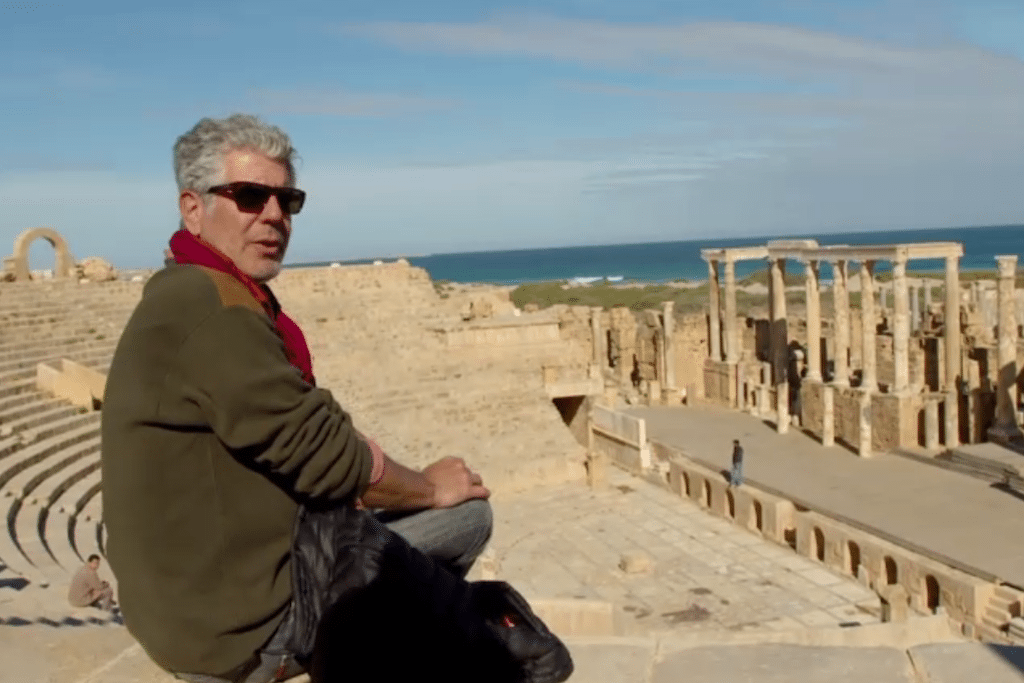Anthony Bourdain’s “Parts Unknown” episode 6 recap: Peace signs in Libya

Skift Take
If Quebec was Bourdain's most gluttonous episode to date, Libya is its most austere.
Geopolitics and Libyan culture are the snippets that viewers and Bourdain feast on in this week's episode; and images of Libyan children offering the peace sign serve as a decadent dessert.
Bourdain calls episode 6 of Parts Unknown "the best piece of work I’ve ever been part of," something at least several viewers will agree with.
The foray into Parts Unknown's most dangerous destination begins with newsreels of the Libyan uprising in 2011. Newscasters' announcements are interwined with Bourdain's explanation of the revolution and the role that social media played in its success.
"They recorded the whole thing on their cell phones... young people heeded the calls for revolution on Facebook and Twitter," describes Bourdain.
Akram, a Libyan local that flew home from Manchester at the first word of revolution attributes Twitter and Google Earth to the movement's success.
Over a breakfast of fried bread and eggs, Akram tells Bourdain, "How did it happen? Easy. Twitter."
Solidarity
For one moment it seems like Bourdain and crew plan to show just one happy side of Tripoli. They arrive just in time for a firework celebration in honor of Prophet Mohamed's birthday, a holiday that one local describes as "...Christmas, the Fourth of July, all rolled into one."
That local is Michel Cousins, the co-founder of the English-language paper the Libya Herald, who Bourdain meets in a traditional male-only coffee house. Cousins is described as having seen many faces of Libya's past, but he refutes fears that its future will like look anything like its neighbors.
"The biggest misconception is that the place is turning into another Afghanistan and Iraq where bombs go off, attacks, but it's not. Libyans have gone through an awful time, people have died, people have struggled, and that's going to hold them together."
A similar sentiment is described by Omar, a travel agent and medical student turned fighter. The first-hand account of Omar's revelation that the groups' goal of overthrowing Gaddafi was indeed possible is heard over a meal of grilled freshly caught fish at a seaside restaurant.
Barakoda is just one of the first images of Libya's impressive coast line on the Mediterranean where any entrepreneuring hotelier would dream of rows of resorts that would easily fill with tourists if not for the country's instability. The vast opportunities for tourism are seen throughout the hour, most notably in Leptis Magna, the gorgeous and empty Roman ruins.
Obstacles ahead
Bourdain; however, does quickly dive into the struggles that still lie heavy on the country's people. Men and women's traditional roles have remain unchanged, the British Foreign Office orders all UK citizens to leave Benghazi early in Bourdain's stay, and the ZPZ film crew of Westerners is regarded with apprehension.
Viewers get a very real look into what it must have been like taping the episode when the crew is forced out of Gaddafi's old palace after a militia group tells them to delete what footage they have of the destroyed grounds.
So proud of my co-workers and friends at ZPZ for tonight's Libya show. It was very, very difficult. But worth it.
— Anthony Bourdain (@Bourdain) May 20, 2013
The important point that Parts Unknown makes is that, despite what foreigners are called out of the country or what local threats exist, locals that live in Tripoli still go about their daily lives.
"If you only look at what's on the news, you miss, maybe, what's a bigger picture," Bourdain surmises.
As much is proven in the Libyan version of KFC, Uncle Ketaki, where the crew talks with Johan, another young Libyan that quickly answered the call for revolution.
"That's why we give it a lot of blood from my country," Johan says while pointing to a Uncle Kentaki chicken sandwich, "because I want the feeling that the taste of freedom."
Freedom can be as simple as a fast food sandwich.
Lasting impact
It is in Misrata that viewers see the most obvious impact of the fighting with bullet holes covering every wall, and where it becomes most apparent that this episode is not a culinary tour of Libya, but a tribute to those that fought in the revolution.
In the Misrata War Museum, the camera pauses on faces of those that were killed in the uprising, giving international attention and honor to those people that fought for change.
As Bourdain relaxes with a group of ex-freedom fights and a picnic lunch of stew, which includes the heart and kidneys of a lamb killed just moments before, he boils down freedom to its most essential ingredients. "...the freedom to enjoy an afternoon that no one thought possible only a little while ago, the freedom at least to joke, to laugh, to be relatively carefree. "
In Libya, he has unveiled more evidence that supports an opinion formed by his very unique world view: "Barbecue may not be the road to world peace, but it's a start."
Psyched for tonight's Libya episode of @partsunknowncnn . Our best EVER. Will actually be able to watch a bit of it before gotta go... 9EST
— Anthony Bourdain (@Bourdain) May 20, 2013




